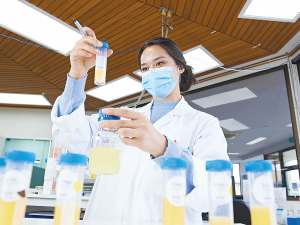LIC lifts half-year revenue on strong demand for dairy genetics
Herd improvement company LIC has posted a 5.2% lift in half-year revenue, thanks to increasing demand for genetics.
 LIC is preparing to inseminate around 200,000 cows with fresh sexed semen this Spring, up from 110,00 the previous year.
LIC is preparing to inseminate around 200,000 cows with fresh sexed semen this Spring, up from 110,00 the previous year.
The number of New Zealand dairy cows mated to sexed semen is set to double this year as farmers look to capitalise on the technology which delivers a 90% chance of producing a female calf.
LIC, the largest supplier of artificial breeding services in New Zealand, is preparing to inseminate around 200,000 cows with fresh sexed semen this spring, up from 110,000 the previous year.
Malcolm Ellis, LIC general manager NZ Markets, says the increased demand is driven by a deeper understanding and realisation among farmers that if they aren't going to be milking more cows in the future, they will need to be milking better cows.
"Using sexed semen helps farmers accelerate the rate of genetic gain by effectively guaranteeing female offspring, their next generation of replacements, from their highest genetic merit cows."
Ellis says it's pleasing to see farmers applying additional focus on the offspring of their superious cows and avoid retaining female replacements from the tail-end cows - a critical aspect of the herd improvement equation.
"Farmers don't need to leave the gender of their calves to chance. By knowing sufficient replacements will be generated from their best cows, farmers are able to consider alternative beef AB options for their poorer performing animals, enabling them to significantly reduce the number of bobby calves leaving the farm."
Otorohanga farmer Marian Numan used sexed semen for the first time last season to help reduce the number of bobby calves their herd produced.
"It was always disappointing to see some of our lovely crossbred bulls going on the bobby truck. Using sexed semen across our top-tier cows has allowed us to produce roughly 30 heifer calves that would have otherwise been bobbies. It's a win-win - we can retain more of our good geneti with less waste overall."
LIC has been supplying sexed semen to farmers for over a decade, but interest in the product has grown significantly in the past two years.
"Weith farmers proactively looking at ways to mitigate consumer, environmental and animal welfare concerns, sexed semen is a useful tool for them to have in their toolbox," Ellis said.
To meet demand, LIC has repurposed an area within their Hamilton headquarters to accommodate a new laboratory facility, says Ellis.
Fresh is Best
LIC is the only provider of fresh sexed semen in New Zealand, which delivers a noticeably better chance of getting a cow pregnant than the frozen alternative.
Ellis says combining LIC's long last liquid semen processing technology with Sexing Technologies' expertise produces a sexed semen product with a near normal conception rate to that of conventional semen.
"Getting cows in-calf is one of the most important parts of any dairy farmer's seasonal focus, so it's critical we deliver a sexed semen product that doesn't notably compromise that goal."
Having Sexing Technologies onsite also means LIC's fresh sexed semen is available to more farmers.
"As we no longer need to transport semen offsite to be sex-sorted, we have significantly reduced the downtime between collection and the sorting process, enabling longer use in the field which ultimately gives more farmers in the opportunity to tap into its value," says Ellis.
Sexing Technologies chief executive, Juan Moreno, says the company is pleased to strengthen their decade-long relationship with LIC.
Reflecting on the past year, Horticulture New Zealand chief executive Kate Scott says there has been a lot to celebrate.
Ministry for Primary Industries (MPI) Director General Ray Smith is giving a big shout-out to the horticulture sector, especially kiwifruit.
Early forecasts for New Zealand's apples and pears point to a standout season marked by exceptional fruit quality and high pack-out rates.
Tickets are now available for Beef + Lamb New Zealand’s (B+LNZ) Out the Gate, returning from 19-21 May 2026 at Te Pae, Christchurch.
Dairy Women's Network (DWN) is welcoming AgriHealth as a new partner.
Northland Field Days patron Ross Newlove remembers the inaugural field days he attended 40 years ago.
OPINION: Fonterra may be on the verge of selling its consumer business in New Zealand, but the co-operative is not…
OPINION: What does the birth rate in China have to do with stock trading? Just ask a2 Milk Company.